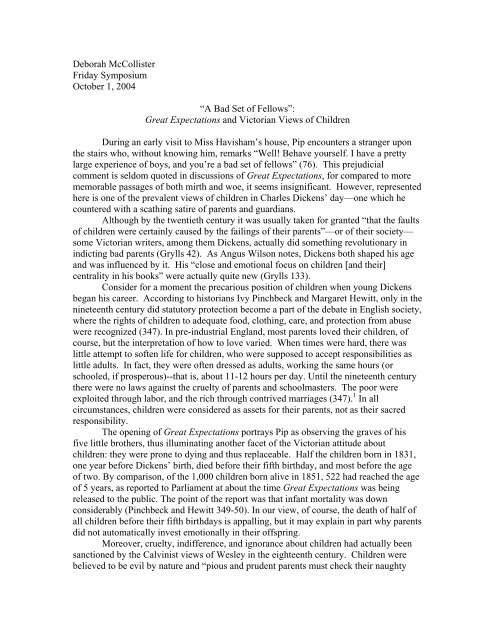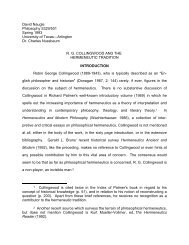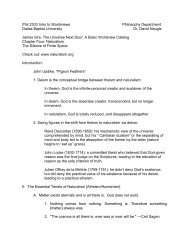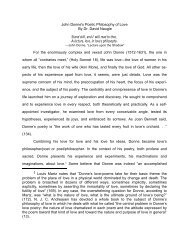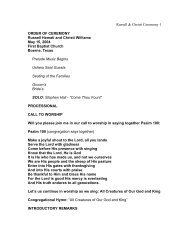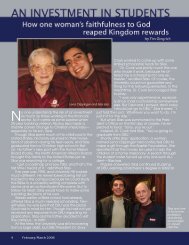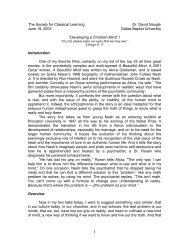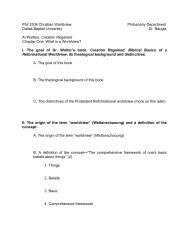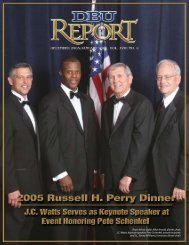A Bad Set of Fellows
A Bad Set of Fellows
A Bad Set of Fellows
You also want an ePaper? Increase the reach of your titles
YUMPU automatically turns print PDFs into web optimized ePapers that Google loves.
Deborah McCollister<br />
Friday Symposium<br />
October 1, 2004<br />
“A <strong>Bad</strong> <strong>Set</strong> <strong>of</strong> <strong>Fellows</strong>”:<br />
Great Expectations and Victorian Views <strong>of</strong> Children<br />
During an early visit to Miss Havisham’s house, Pip encounters a stranger upon<br />
the stairs who, without knowing him, remarks “Well! Behave yourself. I have a pretty<br />
large experience <strong>of</strong> boys, and you’re a bad set <strong>of</strong> fellows” (76). This prejudicial<br />
comment is seldom quoted in discussions <strong>of</strong> Great Expectations, for compared to more<br />
memorable passages <strong>of</strong> both mirth and woe, it seems insignificant. However, represented<br />
here is one <strong>of</strong> the prevalent views <strong>of</strong> children in Charles Dickens’ day—one which he<br />
countered with a scathing satire <strong>of</strong> parents and guardians.<br />
Although by the twentieth century it was usually taken for granted “that the faults<br />
<strong>of</strong> children were certainly caused by the failings <strong>of</strong> their parents”—or <strong>of</strong> their society—<br />
some Victorian writers, among them Dickens, actually did something revolutionary in<br />
indicting bad parents (Grylls 42). As Angus Wilson notes, Dickens both shaped his age<br />
and was influenced by it. His “close and emotional focus on children [and their]<br />
centrality in his books” were actually quite new (Grylls 133).<br />
Consider for a moment the precarious position <strong>of</strong> children when young Dickens<br />
began his career. According to historians Ivy Pinchbeck and Margaret Hewitt, only in the<br />
nineteenth century did statutory protection become a part <strong>of</strong> the debate in English society,<br />
where the rights <strong>of</strong> children to adequate food, clothing, care, and protection from abuse<br />
were recognized (347). In pre-industrial England, most parents loved their children, <strong>of</strong><br />
course, but the interpretation <strong>of</strong> how to love varied. When times were hard, there was<br />
little attempt to s<strong>of</strong>ten life for children, who were supposed to accept responsibilities as<br />
little adults. In fact, they were <strong>of</strong>ten dressed as adults, working the same hours (or<br />
schooled, if prosperous)--that is, about 11-12 hours per day. Until the nineteenth century<br />
there were no laws against the cruelty <strong>of</strong> parents and schoolmasters. The poor were<br />
exploited through labor, and the rich through contrived marriages (347). 1 In all<br />
circumstances, children were considered as assets for their parents, not as their sacred<br />
responsibility.<br />
The opening <strong>of</strong> Great Expectations portrays Pip as observing the graves <strong>of</strong> his<br />
five little brothers, thus illuminating another facet <strong>of</strong> the Victorian attitude about<br />
children: they were prone to dying and thus replaceable. Half the children born in 1831,<br />
one year before Dickens’ birth, died before their fifth birthday, and most before the age<br />
<strong>of</strong> two. By comparison, <strong>of</strong> the 1,000 children born alive in 1851, 522 had reached the age<br />
<strong>of</strong> 5 years, as reported to Parliament at about the time Great Expectations was being<br />
released to the public. The point <strong>of</strong> the report was that infant mortality was down<br />
considerably (Pinchbeck and Hewitt 349-50). In our view, <strong>of</strong> course, the death <strong>of</strong> half <strong>of</strong><br />
all children before their fifth birthdays is appalling, but it may explain in part why parents<br />
did not automatically invest emotionally in their <strong>of</strong>fspring.<br />
Moreover, cruelty, indifference, and ignorance about children had actually been<br />
sanctioned by the Calvinist views <strong>of</strong> Wesley in the eighteenth century. Children were<br />
believed to be evil by nature and “pious and prudent parents must check their naughty
passions in any way they [have] in their power” (quoted in Pinchbeck and Hewitt 351).<br />
Nineteenth-century evangelicals <strong>of</strong>ten inherited Wesley’s views, as did the state. Early in<br />
Dickens’ lifetime, it was not at all unusual for children to be imprisoned and executed, in<br />
fact.<br />
During the decade <strong>of</strong> Great Expectations, however, reform was indeed taking<br />
place. In particular, working class parents who had sent their children to work twelvehour<br />
days in the small spaces <strong>of</strong> the mines and chimneys found that Parliament was<br />
responding to reports that claimed “Amongst no persons do the children <strong>of</strong> both sexes<br />
need so much protection as against their parents” (Pinchbeck and Hewitt 355). 2<br />
At the heart <strong>of</strong> the debate now was the question <strong>of</strong> whether parents had absolute<br />
responsibilities and rights, and the family was to be preserved at all costs; or if the state<br />
had the responsibility <strong>of</strong> caring for children, even if it meant undermining the principle <strong>of</strong><br />
parental responsibility for the feeding and care <strong>of</strong> children (Pinchbeck and Hewitt 358).<br />
When an older sister, Jane, seeks to protect Baby Pocket from pretentious Mrs. Pocket’s<br />
inattention to its playing with a dangerous nutcracker, Dickens comically satirizes this<br />
societal debate through Mr. Pocket’s exasperated cries:<br />
“Belinda,” remonstrated Mr. Pocket. . . . “Jane only interfered for the<br />
protection <strong>of</strong> baby.”<br />
“I will not allow anybody to interfere,” said Mrs. Pocket. “I am surprised,<br />
Matthew, that you should expose me to the affront <strong>of</strong> interference.”<br />
“Good God!” cried Mr. Pocket, in an outbreak <strong>of</strong> desolate desperation.<br />
“Are infants to be nutcrackered into their tombs, and is nobody to save<br />
them?”<br />
“I will not be interfered with by Jane,” said Mrs. Pocket. . . . “I hope I<br />
know my poor grandpa’s position. Jane, indeed!”<br />
. . . “Hear this!” [Mr. Pocket] helplessly exclaimed to the elements.<br />
“Babies are to be nutcrackered dead for people’s poor grandpapa’s<br />
positions!” (180)<br />
Thus, not only did religious attitudes negatively affect the welfare <strong>of</strong> children, but<br />
the stubborn philosophy <strong>of</strong> absolute parental rights did so as well. In this passage we also<br />
see that within the family, Mr. Pocket submits to the authority <strong>of</strong> his wife, as does Joe<br />
Gargery in his household. This submission <strong>of</strong> husband to wife when the children’s<br />
welfare is at stake is puzzling in an age where fathers’ rights were paramount over the<br />
mothers’. The neglect <strong>of</strong> the Pocket children and the abuse <strong>of</strong> Pip by his maternal<br />
guardian are exacerbated by the spinelessness <strong>of</strong> the paternal authorities who by law<br />
actually had the power to protect. However, in truth, paternal rights were generally<br />
fleshed out in terms <strong>of</strong> ownership rather than in nurturing. In this context, Dickens seems<br />
to be asking, “Is nobody to save them?”<br />
The Victorian response to children was, as mentioned before, influenced by the<br />
intellectual tradition <strong>of</strong> John Wesley, whose Calvinist philosophy held that because <strong>of</strong><br />
original sin, children had an incapacity for good. Countering that view was Rousseau’s,<br />
that they were essentially innocent and had an incapacity for evil. Rousseau also believed<br />
in bringing up children not as little adults but rather in line with their natural development<br />
(Grylls 23-33). Victorians seemed to take to extremes <strong>of</strong> both views, with Dickens more<br />
in line with Rousseau’s than with Wesley’s.<br />
2
Dickens’ novels thus present valuable evidence about changing attitudes towards<br />
parents’ and guardians’ care for children. His age saw a distinct movement from<br />
Puritanical and Wesleyan views to more Romantic views reflecting those <strong>of</strong> not only<br />
Rousseau, but <strong>of</strong> Blake and Wordsworth. His views were also informed by his unhappy<br />
childhood, as well as his bringing up nine children <strong>of</strong> his own.<br />
To be sure, the adults do not come <strong>of</strong>f well. As David Grylls has observed, just as<br />
few husbands and wives are happy in the novels, such is the case with parents and<br />
children (132). Of course, Dickens’ basic distrust in moral authority strengthens his<br />
indictment <strong>of</strong> parents, not children, as reprobates. Although he is basically optimistic<br />
about the outcome <strong>of</strong> his children in literature, his attitude towards parents aligns with a<br />
letter in 1844 in which he said “that to him most parents seemed selfish with their<br />
children” (Grylls 147).<br />
It is thus no accident that “the adults are <strong>of</strong>ten ‘placed’ by their attitudes to the<br />
young” in Dickens. Such placement is “the soundest test <strong>of</strong> a character’s moral standing”<br />
(Grylls 140). Pip clearly speaks for Dickens when Pip suffers terrible humiliation after<br />
his first meeting with Estella, who berates him:<br />
My sister’s bringing up had made me sensitive. In the little world in which<br />
children have their existence, whosoever brings them up, there is nothing<br />
so finely perceived and so finely felt as injustice. It may be only small<br />
injustice that the child can be exposed to; but the child is small, and its<br />
world is small, and its rocking-horse stands as many hands high, according<br />
to scale as a big-boned Irish hunter. . . . I had cherished a pr<strong>of</strong>ound<br />
conviction that her bringing me up by hand gave her no right to bring me<br />
up by jerks. (57)<br />
This passage is instructive for several reasons. First, it demonstrates the consequences <strong>of</strong><br />
one’s upbringing in the home upon his or her ability to suffer the injuries <strong>of</strong> the world. In<br />
the text, Pip articulates his realization <strong>of</strong> his sister’s injustice, only after he has known the<br />
injustice <strong>of</strong> someone outside his home, Estella. Dickens also clearly refutes the notion<br />
that children are little adults, needing no more special shielding from the darts <strong>of</strong> the<br />
world than adults. An otherwise small assault is huge to a small person. Moreover, Pip’s<br />
observations about the injustice <strong>of</strong> his sister are drawn from not only experience, but also<br />
intuition. Despite his culture’s teachings that he should be grateful to his sister, his heart<br />
tells him that she has treated him unjustly. Finally, the spirit that impels Pip to kick “my<br />
injured feelings” into the brewery-wall, clean his face, and come from behind the wall<br />
signifies the spirit with which Dickens views children despite their hardships: he is<br />
optimistic about their potential. Critic Jack Rawlins observes: “In most literature,<br />
children are things for moulding and shaping; in the opening chapters <strong>of</strong> Great<br />
Expectations, this child is a thing for defending—a thing that must battle with guts and<br />
spite against the adult forces that constantly demand a renunciation <strong>of</strong> the self” (83).<br />
Pip’s record <strong>of</strong> his own abuse and neglect is, <strong>of</strong> course, the most developed<br />
argument on behalf <strong>of</strong> children in the novel. His being “undersized, for my years, and<br />
not strong” (2) results from his being literally and metaphorically squeezed out from the<br />
table by churchgoers, such as those on Christmas Day (22). Joe spoons extra gravy onto<br />
his plate and furtively promises him pork pie like the others, but allows him to be<br />
dehumanized as he is called a “little monkey” (7) a “squeaker” (24), and a “sixpennorth<br />
<strong>of</strong> halfpence” (22). Pip is also goaded like “an unfortunate little bull in a Spanish arena”<br />
3
(22). Mrs. Joe gives Tickler (her rod <strong>of</strong> punishment) a name, but Pip has one only when<br />
he gives it to himself. Dorothy Van Ghent associates this “picture, in which the qualities<br />
<strong>of</strong> things and people were reversed,” with an environment <strong>of</strong> dehumanization in the age<br />
<strong>of</strong> industrialization (128). This may be true, but as we have shown, the devaluation <strong>of</strong><br />
children was ingrained into the society long before Dickens highlighted it.<br />
Years later, when Pip returns home to attend his sister’s funeral, his consciousness<br />
<strong>of</strong> his sister’s cruelty has grown: “As I walked along, the times when I was a little<br />
helpless creature and my sister did not spare me, vividly returned” (260). Fittingly, she is<br />
now devalued as he once was. Speaking <strong>of</strong> her remains, he says: “[I] began to wonder in<br />
what part <strong>of</strong> the house it—she—my sister was” (261, emphasis mine). When the<br />
undertakers bear his sister’s body to the grave in typical Victorian ceremony, “the six<br />
bearers must be stifled and blinded under a horrible black velvet housing with a white<br />
border, the whole looked like a blind monster with twelve human legs, shuffling and<br />
blundering along” (262). The cruelty <strong>of</strong> parents and guardians to the children in their<br />
homes dehumanizes both the children and the adults, it is implied.<br />
As mentioned earlier, the prevalent view <strong>of</strong> children in Victorian England was<br />
that they were reprobates by nature. Pip’s sister sees him as a young <strong>of</strong>fender “to be dealt<br />
with according to the outraged majesty <strong>of</strong> the law . . . born in opposition to the dictates <strong>of</strong><br />
reason, religion, and morality” (20). Under the burden <strong>of</strong> guilt for aiding the convict, Pip<br />
wonders if even the Church is “powerful enough to shield” him (20-21). After all, the<br />
church and state—as suggested when Pip sees the upside-down church in the<br />
graveyard—are upside-down in relation to Pip’s intuitive sense <strong>of</strong> fairness. What seems<br />
wrong to Pip is held to be right by his culture. As Jack Rawlins asserts, “The novel<br />
begins with Pip caught in Dickens’ own childhood nightmare; he looks at the world and<br />
sees everything out <strong>of</strong> joint, corrupt and unfair, but the adult world assures him that<br />
everything’s fine” (81). After all, the community thinks Mrs. Joe is an admirable<br />
housewife and guardian, and that Miss Havisham is simply eccentric, not cruel and<br />
perverse. “When the church came to itself” (2) in the opening scene, the Church and<br />
state and Victorian society had not yet done so.<br />
Dickens had little patience with parents who, like his own, were unsympathetic<br />
with the desire <strong>of</strong> children to learn. When Pip asks repeatedly about the prison ships that<br />
everyone is talking <strong>of</strong>, Mrs. Joe reprimands him and finally exclaims, “People are put in<br />
the Hulks because they murder, and because they rob, and forge, and do all sorts <strong>of</strong> bad;<br />
and they always begin by asking questions [emphasis mine]. Now you get along to bed!”<br />
(12). Dickens thus condemns guardians who fail to educate the young, and also satirizes<br />
the Victorian belief in criminals having been born with evil predispositions.<br />
In light <strong>of</strong> reports from contemporary Victorian criminologists, Mrs. Joe’s<br />
attitudes toward education are markedly ironic. In 1853, Crime: Its Amount, Causes, and<br />
Remedies was published by Frederic Hill, who according to the title page, was “Barrister-<br />
At-Law, Late Inspector <strong>of</strong> Prisons.” Hill enumerates the chief causes <strong>of</strong> crime in Great<br />
Britain, and heading the list are “bad training and ignorance.” Then he lists remedies, and<br />
leading the list are the spread <strong>of</strong> knowledge and a good education (34). By his own<br />
record, Hill had reported in 1845, “One plain fact showing the extent to which crime is<br />
caused by the neglect <strong>of</strong> children, is the large number <strong>of</strong> orphans always to be found in<br />
prison . . . . and the greater portion <strong>of</strong> the parents who were living were not <strong>of</strong> good<br />
character” (36-37). He added that being able to read and write shielded children from<br />
4
crime; most prisoners were illiterate (40). Hill proposed altering the law to make “a<br />
parent really responsible, till his <strong>of</strong>fspring arrive at years <strong>of</strong> discretion, for his child’s<br />
maintenance and conduct” (50). Hill’s lengthy volume, written less than a decade before<br />
the novel discussed here, actually contains some six pages <strong>of</strong> reports and case studies<br />
with headings <strong>of</strong> “Neglect <strong>of</strong> Parents” and “Parental Responsibility” (51). 3 Dickens’<br />
novel <strong>of</strong> reform was thus working in tandem with other daring voices <strong>of</strong> reform in his<br />
culture. 4<br />
Pip’s education, such as it is, is at the substandard school <strong>of</strong> Mr. Wopsle’s aunt.<br />
With what little he learns he wants to educate Joe, but the two must engage in writing on<br />
the sly because Mrs. Joe “ain’t partial to having scholars on the premises . . . for fear as<br />
[Joe] might rise” (44). Thus, as Pip inwardly questions his sister’s right to beat him and<br />
to deny him an education, Joe defends her. As one critic has noted, “Joe cannot rage, and<br />
so reinforces the lesson <strong>of</strong> the Pumblechookian perspective: a good person wouldn’t feel<br />
what Pip is feeling” (Rawlings 81).<br />
In the lengthy exposition, then, <strong>of</strong> Great Expectations, Dickens continues to ask<br />
“Is nobody to save the children?” Ironically, the one who most clearly protects Pip is the<br />
convict Magwitch. His false, protective claim that he stole the pork pie entitles him to<br />
become “my convict” to Pip—a role that will enlarge so that he is eventually the tale’s<br />
hero, according to critic John Irving (xxvi). Magwitch will in fact risk more than Joe or<br />
any other character—his very life—to pay paternal attention to the adult Pip.<br />
Magwitch’s history reflects the Victorian debate <strong>of</strong> nature versus nurture. When<br />
Pip asks him “What were you brought up to be?” Magwitch replies, “A Warmint, dear<br />
boy.” Dickens records: “He answered quite seriously, and used the words as if it denoted<br />
some pr<strong>of</strong>ession” (306). Like Pip, he knows little <strong>of</strong> his birth, having only a vague<br />
memory <strong>of</strong> someone abandoning him. “When [he] was a ragged little creetur as much to<br />
be pitied as ever I see,” he gained the reputation <strong>of</strong> being “hardened.” Society<br />
“measured” him and gave him speeches and tracts that he could not understand.<br />
Nameless persons—presumably religious ones—spoke <strong>of</strong> the devil to him. When<br />
Compeyson spotted him, he was ready to be used for mischief (321). Although some<br />
would say Magwitch was born evil, it is clear that society has nurtured him to err.<br />
Dorothy Van Ghent posits: “We are led to identify Magwitch’s childhood with Pip’s; the<br />
brutality exercised toward both children was the same brutality, though the ‘parents’ in<br />
the one case were private persons, and in the other, society” (135).<br />
Like many victims <strong>of</strong> abuse, Joe denies that those he has loved—his wife and his<br />
father—have done him ill. When Joe discloses his history to Pip, we learn that in this<br />
case, too, lack <strong>of</strong> education is part <strong>of</strong> the picture. Joe did not go to school because <strong>of</strong> his<br />
father’s abuse, and ran away repeatedly along with his mother, in order to escape abuse.<br />
But “My father were that good in his hart, don’t you see” to find them, beat them, and<br />
take Joe out <strong>of</strong> school. Pip, with more insight into injustice than Joe, does not see<br />
goodness in Joe’s father. Somehow Joe transfers his sympathy for his “poor mother” to<br />
the rampaging Mrs. Joe, and fears abusing her so much that he suffers her abuse—and<br />
allows Pip to suffer it. He rationalizes his failure to protect Pip with an apology: “I wish<br />
there warn’t no Tickler for you, old chap . . . . I hope you’ll overlook shortcomings.” Pip<br />
admires Joe, his “equal,” for this disclosure, but alas, Pip thus has no protector (45).<br />
Significantly, after Joe’s sincere rationalization for his allowing Mrs. Joe to abuse<br />
both himself and Pip, Pip looks at the stars and “considered how awful it would be for a<br />
5
man to turn his face up to them as he froze to death and see no help or pity in all the<br />
glittering multitude” (45). Dickens suggests, if adults on earth abscond from their<br />
responsibility for the young, is there no hope from the heavens as well?<br />
The very hierarchy that keeps Pip under the absolute authority <strong>of</strong> his guardian,<br />
Mrs. Joe, who is twenty years older, fails to protect him because Mr. Joe does not assume<br />
the traditional role in that hierarchy. He is “a larger species <strong>of</strong> child, and . . . no more<br />
than my equal.” Moreover, Mrs. Joe uses Pip as a “connubial missile” (7). Thus Pip is<br />
beaten severely, and while still crying and rubbing himself, he is thrown at Joe. Joe<br />
worries if he thinks Pip eats too quickly, and spoons on extra gravy at Christmas, but he<br />
is incapable <strong>of</strong> saving Pip from unrelenting abuse.<br />
At the end <strong>of</strong> the novel there is, <strong>of</strong> course, hope for Pip to be a noble character<br />
despite his harsh treatment at the hands <strong>of</strong> Mrs. Joe. His moral downfall seems to have<br />
been more <strong>of</strong> his own making than <strong>of</strong> hers. Similarly, Biddy is very bright and good—in<br />
fact, a perfect woman—despite her “hopeless circumstances” (118) as an orphan also<br />
“brought up by hand” (40). She reflects the Wordsworthian, romantic view <strong>of</strong> children<br />
born wise beyond their years, with heavenly wisdom—what David Grylls calls the “cult<br />
<strong>of</strong> juvenile innocence” (133). Herbert, judging by Pip’s observations <strong>of</strong> the Pocket<br />
children’s “not growing up or being brought up, but . . . tumbling up” (172), is<br />
nevertheless a good person, even if he does seem to absorb some <strong>of</strong> the ineptitude <strong>of</strong> his<br />
parents.<br />
The doctrine <strong>of</strong> natural goodness in Victorian times held that it was wicked to rob<br />
children <strong>of</strong> their childhood, and that spoiling them was less harmful than making them<br />
assume adult hardship (Grylls 140). Miss Havisham, according to Herbert, was a “spoilt<br />
child,” a motherless girl whose father denied her nothing (166). She inherited his riches<br />
and pride, and now she is guardian <strong>of</strong> a “spoilt child” <strong>of</strong> her own, Estella.<br />
Far from being harmless, however, she is perhaps the most evil character in the<br />
novel in that she “is guilty <strong>of</strong> aggression against life in using the two children, Pip and<br />
Estella, as inanimate instruments <strong>of</strong> revenge for her broken heart—using them, that is, as<br />
if they were not human but things” (Van Ghent 131). Jaggers, who represents civil law,<br />
has placed Estella in harm’s way by placing her with Miss Havisham. Even play is a<br />
“sick fancy” <strong>of</strong> hers, by her own admission, and she spoils and manipulates Estella with<br />
jewels and with lessons on how to “break [Pip’s] heart” (54). Dorothy Van Ghent calls<br />
the scene where she orders the two children to play a “potent symbol <strong>of</strong> childish<br />
experience <strong>of</strong> adult obtuseness and sadism” (128).<br />
Estella is about Pip’s own age, but when he meets her she is “as scornful <strong>of</strong> me as<br />
if she had been one-and-twenty, and a queen.” She ruefully calls him “boy” (52). Miss<br />
Havisham has not only deployed a scheme to “wreak revenge on all the male sex” (164),<br />
but has abused Estella by robbing her <strong>of</strong> innocence and childhood. Miss Havisham’s<br />
“pride and hope” are in a girl whom she will fashion to have no mercy, like herself (88).<br />
John Kucich, in “Intellectual Debate in the Victorian Novel,” recalls that “Jaggers . . .<br />
presents Pip with a chilling vision <strong>of</strong> all the children in the world being ‘so much spawn,<br />
to develop into the fish that were to come to his net—to be prosecuted, defended,<br />
forsworn, made orphans, bedeviled somehow.” Yet Jaggers actually credits himself for<br />
sparing Estella—“one pretty little child out <strong>of</strong> the heap who could be saved” (229). The<br />
blind arrogance <strong>of</strong> one empowered to effect change may outrage readers.<br />
6
G. K. Chesterton defended Charles Dickens’ so-called caricatured characters,<br />
some <strong>of</strong> whom we mention above, by saying that “England was a much more amusing<br />
and horrible place than it appeared to the sort <strong>of</strong> man who wrote reviews” (quoted in<br />
Irving xii). In our age we may think that Dickens exaggerated the treatment <strong>of</strong> children<br />
in his novels, but if we place ourselves within his social milieu, we understand that he<br />
actually showed some amount <strong>of</strong> restraint along with his outrage.<br />
In the mid-nineteenth century many philanthropic organizations “sprang up [and]<br />
showed all too clearly how many children were in fact still neglected and maltreated by<br />
irresponsible and malicious parents.” Indeed, a new social conscience seemed to arise in<br />
regards to the responsibilities <strong>of</strong> parents, so that late in the century, specific legislation<br />
was at work (Pinchbeck and Hewitt 385).<br />
In spirit and in body, children had always suffered at the hands <strong>of</strong> neglectful or<br />
abusive guardians. To recall the opening scene <strong>of</strong> Great Expectations is to recall,<br />
however, that now Dickens—and others in his society—were positing that the suffering<br />
and death <strong>of</strong> children should be significant to those empowered to reform. Rather than<br />
creating a novel <strong>of</strong> manipulative sentimentality, Dickens was actually raising his culture’s<br />
awareness <strong>of</strong> the young and presenting the challenge ironically suggested by the<br />
ineffectual Matthew Pocket: “Is nobody to save them?”<br />
Notes<br />
1<br />
“Not until 1929 was the age <strong>of</strong> consent [for marriage] raised to sixteen,” according to<br />
Pinchbeck and Hewitt (349).<br />
2<br />
In 1863,Charles Kingsley wrote <strong>of</strong> chimney sweeps in Water Babies—little children<br />
who were suffocated, beaten if resisting their task, and even forced to climb up into<br />
chimneys by fires lit beneath them (Pinchbeck and Hewitt 349). Kingsley’s novel, <strong>of</strong><br />
course, is reminiscent <strong>of</strong> William Blake’s “Chimney Sweep” in Songs <strong>of</strong> Innocence and<br />
Experience, who resolves his misery by accepting his life and looking forward to one in<br />
heaven.<br />
3<br />
Hill’s volume is replete with case studies, such as this report: “The chaplain <strong>of</strong> the<br />
Glasgow prison says ‘Of the youthful criminals <strong>of</strong> both sexes . . . I have not known more<br />
than three or four cases where the culprits were living under the ro<strong>of</strong> <strong>of</strong> religious and<br />
moral parents, and had received a good education, where they have fallen into a course <strong>of</strong><br />
crime” (51).<br />
4<br />
Also note that education is a theme and indeed a satirical feature <strong>of</strong> Dickens’ work from<br />
the 1830s and 1840s, as in Nicholas Nickleby.<br />
7
Works Cited<br />
Dickens, Charles. Great Expectations. 1860-61. New York: Bantam, 1986.<br />
Grylls, David. Guardians and Angels: Parents and Children in Nineteenth-Century<br />
Literature. London: Faber and Faber, 1978.<br />
Hill, Frederic. Crime: Its Amount, Causes, and Remedies. London: John Murray, 1853.<br />
Irving, John. Introduction. Great Expectations by Charles Dickens. New York: Bantam,<br />
1986.<br />
Kucich, John. “Intellectual Debate in the Victorian Novel: Religion, Science, and the<br />
Pr<strong>of</strong>essional.” In The Cambridge Companion to the Victorian Novel. Ed. Deirdre<br />
David. Cambridge: Cambridge UP, 2001. 212-33.<br />
Pinchbeck, Ivy and Margaret Hewitt. Children in English Society. Vol. 2. London:<br />
Rouledge and Kegan Paul, 1973.<br />
Rawlings, Jack. “Great Expiations: Dickens and the Betrayal <strong>of</strong> the Child.” In Great<br />
Expectations by Charles Dickens. Ed. Roger D. Sell. New Casebooks. London:<br />
Macmillan, 1994.<br />
Van Ghent, Dorothy. The English Novel: Form and Function. New York: Holt, Rinehart,<br />
and Winston, 1966.<br />
8


